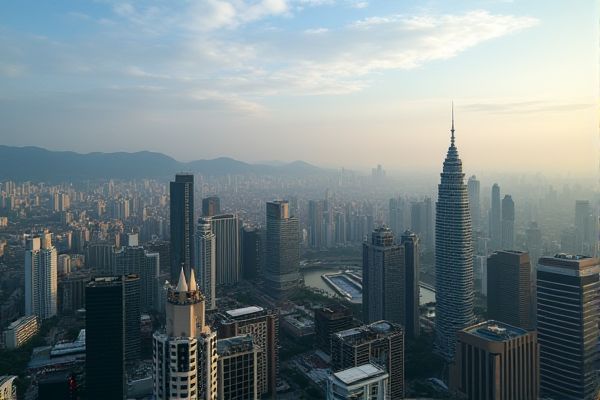
Moving to Malaysia checklist: Visa and work permits. Cost of living. Housing options. Healthcare and insurance. Banking and finances. Cultural etiquette and customs. Transportation systems. Language and communication. Local cuisine. Expat community support.
Visa and work permits.
To move to Malaysia for work, you need to obtain an Employment Pass, which requires documents such as a valid passport, updated resume, employment contract, highest educational certificates, and recent passport photos. The process involves employer approval for a foreign worker quota, Expatriate Post approval, and submission of the work permit application to the Immigration Department. This procedure is essential for ensuring that all necessary documents and approvals are in place for a smooth transition into the Malaysian workforce, helping international employees to align with the country's regulations effectively.
Cost of living.
In Malaysia, the cost of living is relatively affordable, especially outside of Kuala Lumpur. A single person may need around 2,500 to 3,500 MYR per month to live comfortably, with average rents for a one-bedroom apartment in Kuala Lumpur's city center being approximately 1,612 MYR per month, and basic utilities costing between 200 and 300 MYR per month. For more in-depth insights on this topic, you can visit the Malaysia Cost of Living Expert Guide where detailed analysis is provided for those considering moving or traveling to Malaysia.
Housing options.
In Malaysia, expats can choose from a variety of housing options including large standalone houses, semi-detached and terraced houses, apartments, and condominiums, with popular areas being Kuala Lumpur, Penang, and Johor Bahru. The process of finding accommodation can be facilitated through estate agents or online platforms.
Healthcare and insurance.
When moving to Malaysia, expats should consider purchasing private health insurance, as public healthcare is not available to them. Options include international providers like AXA, Allianz, and Aetna, or local providers, with some expats also eligible for the Foreign Worker Hospitalization and Surgical Scheme if employed.
Banking and finances.
When planning to open a bank account in Malaysia, the first step is to decide between a savings or a current account. You'll be required to present essential documents such as a valid passport, visa confirmation letter, proof of accommodation, and an initial deposit. Additionally, you might find advantageous arrangements through your institution or local banks such as Maybank, CIMB, and RHB Bank. Many of these banks offer the convenience of 24/7 internet and phone banking services, as well as ATM access nationwide with the MEPS logo. For a comprehensive guide on the process, you can visit the Study Abroad Guide provided by MSM Unify's blog, which details the necessary steps and considerations.
Cultural etiquette and customs.
When moving to Malaysia, it is crucial to respect local customs, such as removing shoes before entering homes or places of worship, using the right hand for eating and interactions, avoiding public displays of affection, and showing respect to elders by addressing them with titles like "uncle" or "aunty." Additionally, gifts should be halal, avoid items made of pigskin, and be wrapped in appropriate colors, with gifts typically not opened in the presence of the giver. For more detailed insights on these cultural practices, you can visit the Facts and Details website on Malaysia.
Transportation systems.
In Malaysia, the transportation system includes various options such as the Mass Rapid Transit (MRT), Light Rail Transit (LRT), monorail, and extensive bus networks like MyRapid Bus. These systems are available in major cities, particularly in the Klang Valley, and offer convenient and relatively affordable travel with fares ranging from RM0.80 to RM8.00, depending on the mode of transport and payment method. For more detailed information on these services, you can visit the Blog which explores the diverse transport options available in Malaysia's metropolitan areas.
Language and communication.
In Malaysia, the official language is Malay, but English is widely spoken, particularly in education, communication, and government offices, making it easier for expats to navigate the country. Learning basic Malay phrases can enhance interactions with locals and deepen cultural understanding. For more detailed insights, the Expat Info Desk provides valuable information on language dynamics in Kuala Lumpur.
Local cuisine.
When moving to Malaysia, be prepared to immerse yourself in a diverse culinary scene featuring dishes like Nasi Lemak, Laksa, and Satay, which each offer unique flavor profiles and cultural influences. In Kuala Lumpur, you'll encounter a rich food culture with popular dishes such as Mee Goreng Mamak and Rendang, and vibrant street food markets that showcase the city's culinary diversity. Must-try dishes include Ikan Bakar and Roti Canai, reflecting the country's blend of Malay, Chinese, and Indian culinary traditions, available at various street food markets and hawker centers. For a first-time visitor or expat, exploring the traditional Malaysian dishes is essential, as these meals highlight the nation's aromatic and flavorful cuisine. To delve deeper into the culinary world of this vibrant country, visit the Malaysia Food Guide, which provides a comprehensive overview of must-try delicacies, showcasing Malaysia's rich, multicultural heritage.
Expat community support.
For expat community support in Malaysia, consider joining groups like Manza, AAM, and InterNations, which offer social activities, charitable events, and valuable resources to help expats integrate and navigate life in Malaysia. These organizations provide a platform for forming connections, accessing local insights, and participating in cultural events, making the transition to Malaysia more seamless.
